Survey: Homeschool And Christian School Graduates Far More Likely To Keep Their Faith
Americans who spent at least three high school years homeschooling or attending a Protestant Christian school are much more likely than public school graduates to express Christian beliefs and attend church as adults, finds a recently released survey. Those surveyed who spent at least three years in a Roman Catholic high school are about as likely to attend church and read the Bible as Americans who attended public schools.
“Consistent with previous administrations of [this survey], faith formation is the domain in which the strongest evidence for sector-level effects can be observed, with a clear benefit to respondents who graduated from Protestant schools or were homeschooled,” says the Cardus Education Survey report released Dec. 4. “These graduates are much more likely to report believing in God and life after death, as well as engaging in religious practices.”
Christians are far bigger charitable givers, community volunteers, and supporters of constitutional rights than their secular counterparts. Christians are also more likely to have children at population-sustaining rates. All this makes their prevalence in American society a key national interest.
The U.S. birthrate is at its lowest ever, 1.6 children per woman. This creates demand for foreign migration and hammers the national budget — especially defense spending — by accelerating the already occurring bankruptcy of Social Security and Medicare.
No other nation dropping off a population cliff has been able to reverse it by subsidizing parenthood, finds a November Heritage Foundation report. “The decline in fertility rates in the United States is driven largely by a decline in religiosity,” it shows. America’s decline in religiosity, in turn, is virtually entirely driven by government subsidies for secular education, the Heritage report says, as it erodes children’s faith and therefore their contributions to national economic security via forming stable families.
The bottom line: anti-religious public education is erasing America’s future by killing Americans’ willingness to nurture the next generation. The Cardus survey adds more data to this already well-documented reality.
Cardus, a nonpartisan Christian think tank, commissioned Ipsos Public Affairs to survey a nationally representative sample of 2,350 high-school graduates ages 25 to 39. To isolate the effects of high school type, the researchers controlled for factors including age, sex, race, geographic location, poverty level, parents’ education and marital status, and childhood religion.
Those who spent at least three years in a Protestant high school or homeschooling were 20 and 24 points, respectively, more likely to express a belief in God than were public-school graduates. Forty percent of public-school graduates said “Yes, I definitely believe” in God or a higher power, while 60 percent of Protestant school and 64 percent of homeschool graduates said the same.
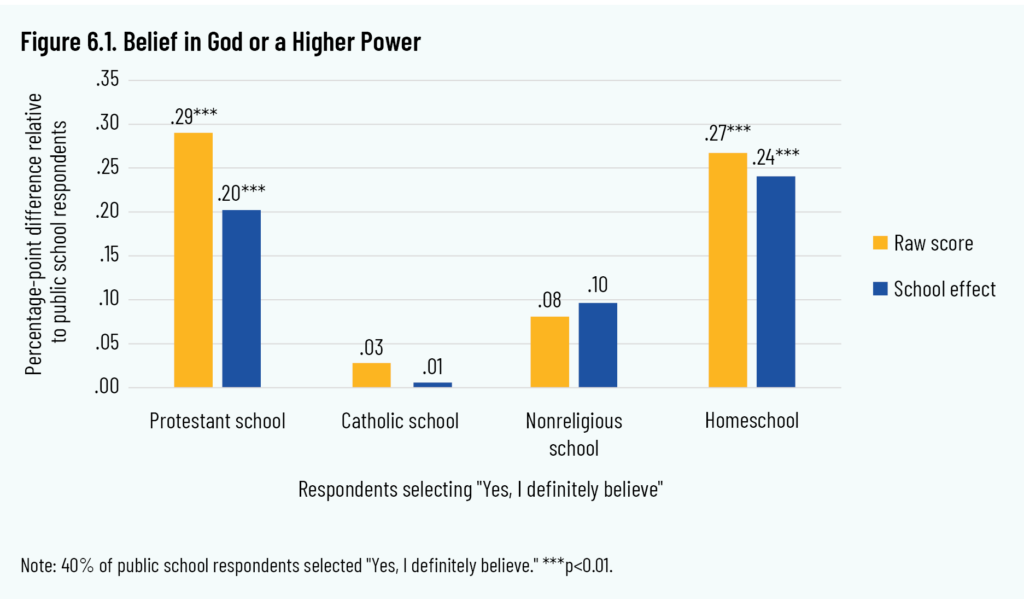
Far fewer Americans follow through on their alleged belief in God by attending church and reading the Bible, but on these measures homeschool and Protestant school graduates were also significantly more engaged than Catholic and public-school graduates. Thirty-four percent of Protestant school graduates read the Bible (or “some sacred text”) at least once a week, as do 51 percent of homeschool graduates.
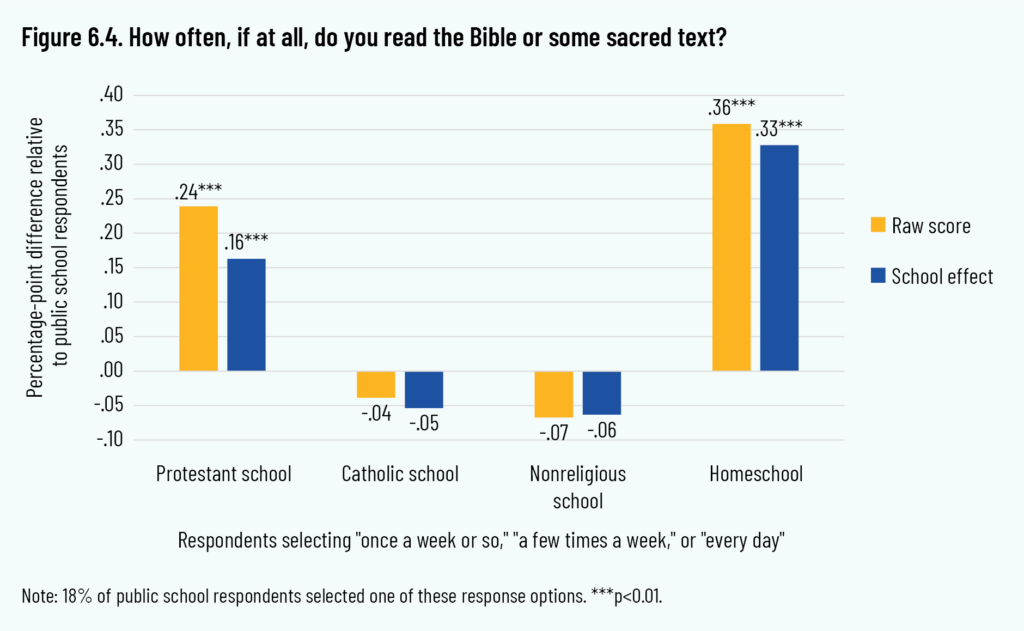
According to the survey, only 18 percent of public school graduates attend church or read the Bible at least once a week. Forty-eight percent of homeschool graduates attend church at least once a week, as do 29 percent of Protestant school graduates. Catholic and nonreligious private school graduates were less likely than public school graduates to attend church at least once a week, although the difference between these groups was statistically insignificant.
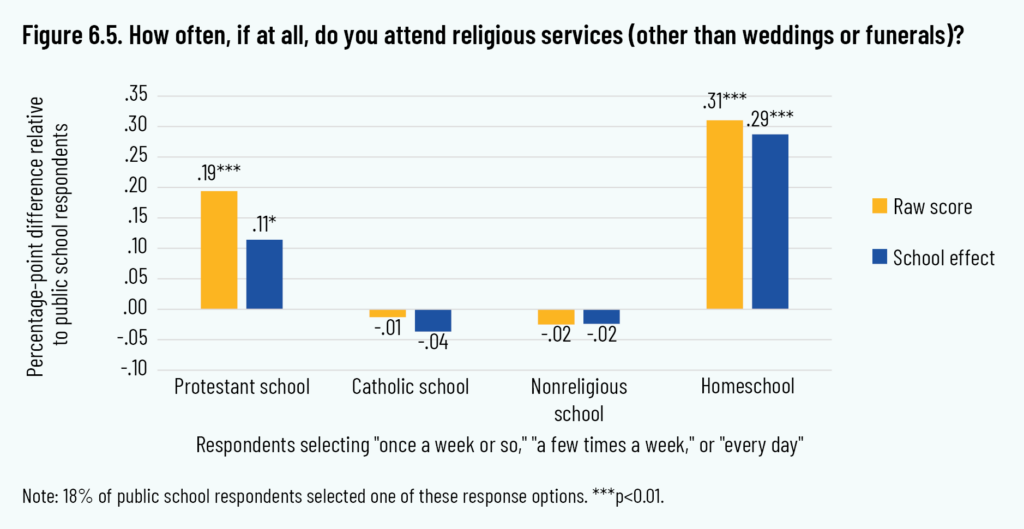
Many respondents who don’t personally read the Bible or attend church regularly said it is important for parents to teach children their faith. Forty-four percent of public-school-educated respondents agreed with this, as did 60 percent of Protestant school graduates and 67 percent of homeschool graduates.
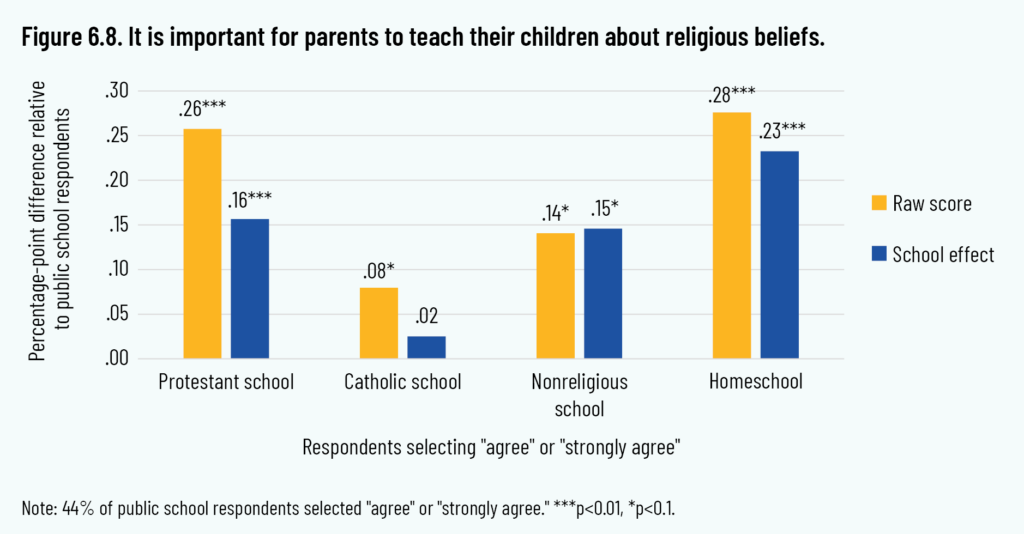
Numerous gold standard studies — conducted via randomized, controlled trial — find that, compared to public school graduates, students who attend largely Christian schools via school choice programs have higher graduation rates and test scores, earn more higher education degrees, volunteer more and make more charitable donations, are more tolerant of others’ rights, are less likely to commit crimes, know more about American government, and are more patriotic.
The significantly deeper faith commitments of those who graduate from religious schools is also documented globally. A research review published in 2020 shows that “increasingly secularized government control of education … can account for virtually the entire increase in secularization around the developed world.”
As a result of such evidence, Heritage report authors Jay P. Greene and Lindsey Burke recommend K-12 school choice and cleaning out higher education policies that delay family formation as the most effective way to address America’s catastrophic baby bust. The Cardus survey also supports this by showing those with the highest career focus — graduates of secular private schools — were also the least likely to be married.
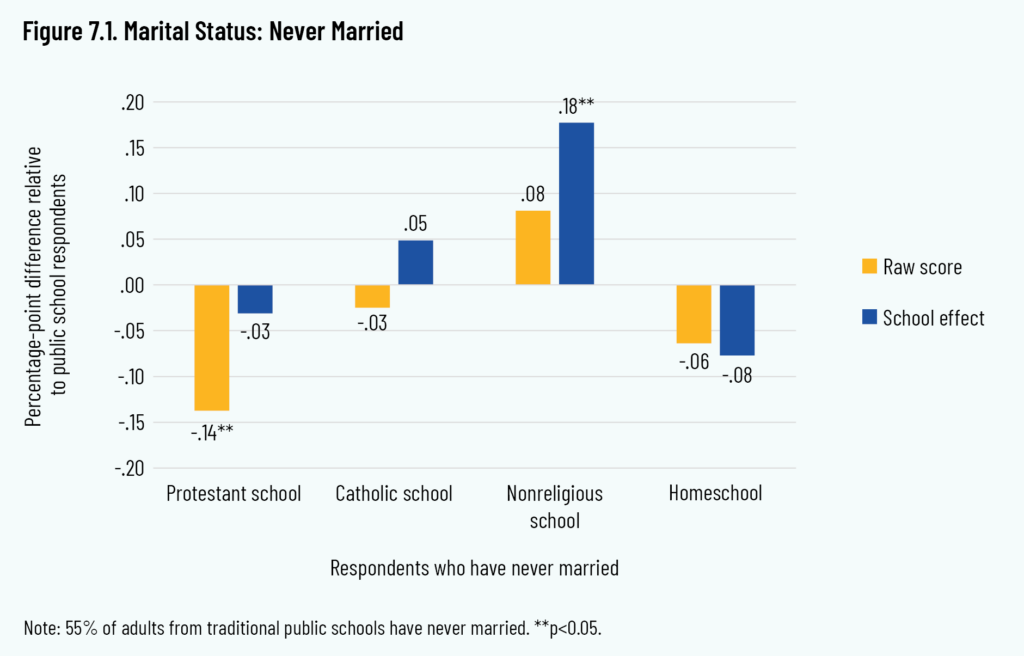
“Lowering barriers to families selecting a school of their choice, including religious education for their children, increases the odds that parents will have children and that a larger share of those children will retain religious beliefs and practices that boost marriage and fertility,” says the Heritage report.
The Cardus Education Survey was also conducted in 2011, 2014, and 2018. The results released last week come from surveys administered in October 2023. The survey also queried respondents on their perceptions of high school, educational and employment outcomes, civic engagement, happiness levels, and rates of family formation.
The average person who graduated from a Christian high school or homeschool spent at least half his K-12 career in public schools, according to the latest Cardus survey. Nearly 90 percent of the respondents spent at least one K-12 year in a public school. That means these results are likely stronger for those who spent their entire K-12 years in a Protestant or home school.





Comments are closed.